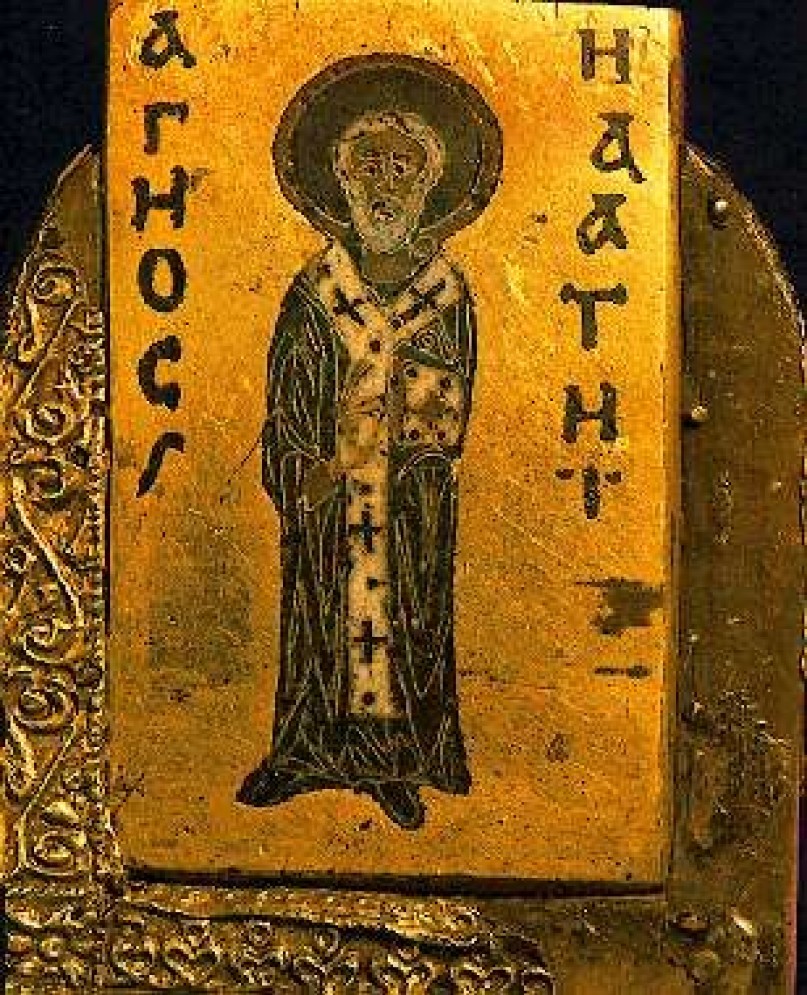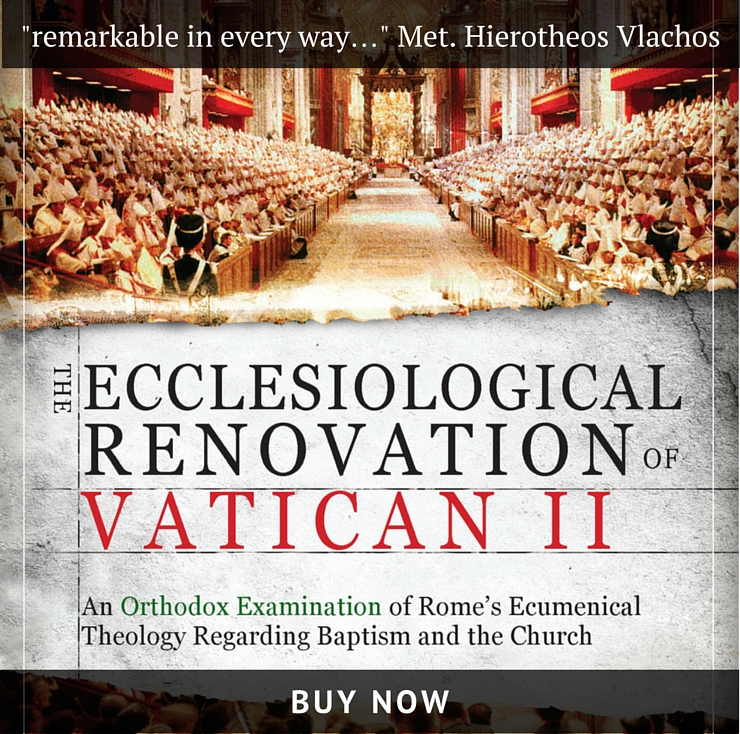The infamous heretic Nestorius occupied the Patriarchal throne of Constantinople from April 428 unto August 431. According the St. Theophanes the Confessor as soon as Nestorius "mounted the throne, his heresy and
his doctrinally distorted mind were straight away revealed." According to this same Saint the "the holy and ecumenical synod (more than 3 years after Nestorius began preaching blasphemies) ... decided against him and stripped him of all priestly rank. They arranged for his deposition to be announced to him in person ... (and) on the confirmation of Nestorios' deposition Maximianus was ordained bishop of Constantinople". This occurred in 431.
During the more than 3 years that Nestorius was preaching heresy bare-headedly in the Church (St. Cyril of Alexandria comments that this happened frequently and that he did not cease from this activity); different Saints responded to this atrocity in various ways. We will briefly look at the example of St. Hypatius of Rufinianus and then at the examples of St. Cyril of Alexandria and St. Celestine of Rome who worked together to quench this fire of heresy.
St. Hypatius was an Abbot in Constantinople. He received a revelation from God that "In three and a half years this tare (Nestorius) will be uprooted.” When St. Hypatius "understood that Nestorius held opinions contrary to those which should be acknowledged, he immediately "erased his name from the diptychs" and stated: "From the time that I learned that he said unrighteous things about the Lord, I have no longer been in communion with him and I do not commemorate his name; for he is not a bishop*.” It is worthy to note that St. Hypatius ceased commemoration of Nestorius alone. He did not break communion with Nestorius and everyone who was in communion with Nestorius (which of course included many Saints and people who were lawfully struggling against heresy by different means).
*The characterization of a bishop as a “pseudo-bishop” (as found in canon 15 of the 1st-2nd Synod) or as "not a bishop" (in the words of St. Hypatius) prior to a synodal decision is heuristic or diagnostic in nature and not final and juridical or condemnatory. As a consequence of this grace-filled mysteries are still performed by the "pseudo-bishop" before a Synodal condemnation.
St. Cyril of Alexandria, however, acted differently than Saint Hypatius. He collected written accounts of the blasphemies of Nestorius (while maintaining communion with him for years) and sent them to St. Celestine (Pope of Rome). In his 11th letter St. Cyril states that at first he "was silent during the time past, and I have written absolutely nothing either to your reverence concerning the one (Nestorius) who is now in Constantinople and administers the church, nor have I written to any other of our fellow bishops, believing that in these matters precipitate action is not without blame. But since we have come to a crest of the evil, as it were, I thought it was absolutely necessary to loosen my tongue hereafter and to say that everything is in turmoil."
He further states in the same letter: "that, although I wished to make it clear to him by a synodical letter that we are unable to have dealings with one who says and thinks these things, *I HAVE NOT DONE THIS*. But because I thought that it is necessary to offer a hand to those who slipped and to raise them as fallen brethren, I advised him through letters to desist from such false teachings."
In addition St. Cyril stated: "But *WE DO NOT THROW OFF COMMUNION WITH HIM OPENLY*, until we have communicated these matters to your reverence. Wherefore deign to specify what seems best, and whether it is necessary to be in *COMMUNION WITH HIM SOMETIMES*, or to forbid (communion) henceforward openly because no one is in communion who thinks and teaches such things."
It seemed that St. Cyril (after Nestorius started preaching heresy bare-headedly) was at first silent. And then wrote letters to try to correct Nestorius. St. Cyril states that these letters "profited nothing" for Nestorius "clings even until now to his original errors, and does not cease saying distorted things." After all of this St. Cyril sought the advice of Pope Celestine concerning various methods of combating this heresy. These methods included both the breaking of or maintenance of communion.
St. Celestine replied to St. Cyril : "Nevertheless we ought to recall, if we can, one who is hurrying toward the very crags, or rather already lingering on the crag itself whence he will fall, lest we shall hasten his fall by not rescuing him. Christ, our God, about whose birth questions are being raised, taught us to take pains for one sheep, desiring to recall it even on His own shoulders, lest it be exposed to the wolf for prey. And so then, how does He, who taught us to move so quickly for the safety of one sheep, desire us to take pains for the shepherd of the sheep himself, who, having forgotten the name itself and the mandate of shepherd, turned himself into the rapacity of a wolf desiring to destroy the flock which he himself ought to keep safe? We ought to *REMOVE THIS SHEPARD* from the fold of the lambs *IF WE DO NOT CORRECT HIM*, as we desire ... It is our wish that there still be hope of pardon for the one being corrected, so that he may return and live ... But let there be an open judgment against him *IF HE CONTINUES*, for such a wound must be cut out ... Wherefore let them share in our communion whom he put away from communion (St. Cyril remarks in his 17th letter that many were "excommunicated for the faith" or "deposed" by Nestorius for combating his heresies; it is these St. Celestine is here referring to) because they speak against him, and let him know that he cannot share our communion *IF HE PERSISTS* in this path of perversion ... Within ten days, counting from the day of this warning, he should either condemn his evil teachings by a written confession, and strongly affirm that he himself holds that belief concerning the birth of Christ, our God, which the Church of Rome, and the church of your holiness, and universal devotion upholds, or, if he should not do this, your holiness, because of care for that church, should immediately understand that he must be *REMOVED FROM OUR BODY*..."
It was after all of the above, that the Pope convened a local Synod and condemned the errors of Nestorius in the year 430. Subsequently St. Cyril wrote his 17th letter containing the12 anathemas which he urged Nestorius to accept. In this letter St. Cyril refers to the soon to be condemned heretic as "the most pious and most God-loving fellow bishop Nestorius". It was after Nestorius refused to anathamatize his heresies, that the 3rd Ecumenical Synod was convened which cast Nestorius out of the Church.
Conclusion: The actions of both St. Cyril and St. Celestine clearly show that Nestorius was not automatically cut off from the Church the moment he started teaching heresy. It rather shows that he was allowed to remain in the Church unto his potential repentance (which sadly did not happen) or until his synodal condemnation. In the years preceding the 3rd Ecumenical Synod both St. Cyril and St. Celestine maintained communion with Nestorius at least until his rejection of the proposed anathemas of St. Cyril; it is possible that this communion was even maintained until the 3rd Synod itself. It is therefore interesting to note that "maintaining communion" before a Synodal condemnation is indeed a Patristic path; as is withdrawing oneself "from communion with their president (singular), who, that is to say, is preaching the heresy publicly" (canon 15 of the 1st-2nd Synod).
Excepting these 2 paths of combating heresy (before a Synodal condemnation) when it is being preached from within the confines of the Church; I am not aware of any other Patristic path available (for individuals). I also am not aware of any examples from Church history when "maintaining communion" before a Synodal condemnation was condemned; nor am I aware of any instances when the heresy-resisters ceased communion with not only the heretic but also with the Orthodox who maintained communion before a Synodal condemnation.
- Compiled by Gregor Isiopili



Please be kind, lest your comment go the way of Babylon.